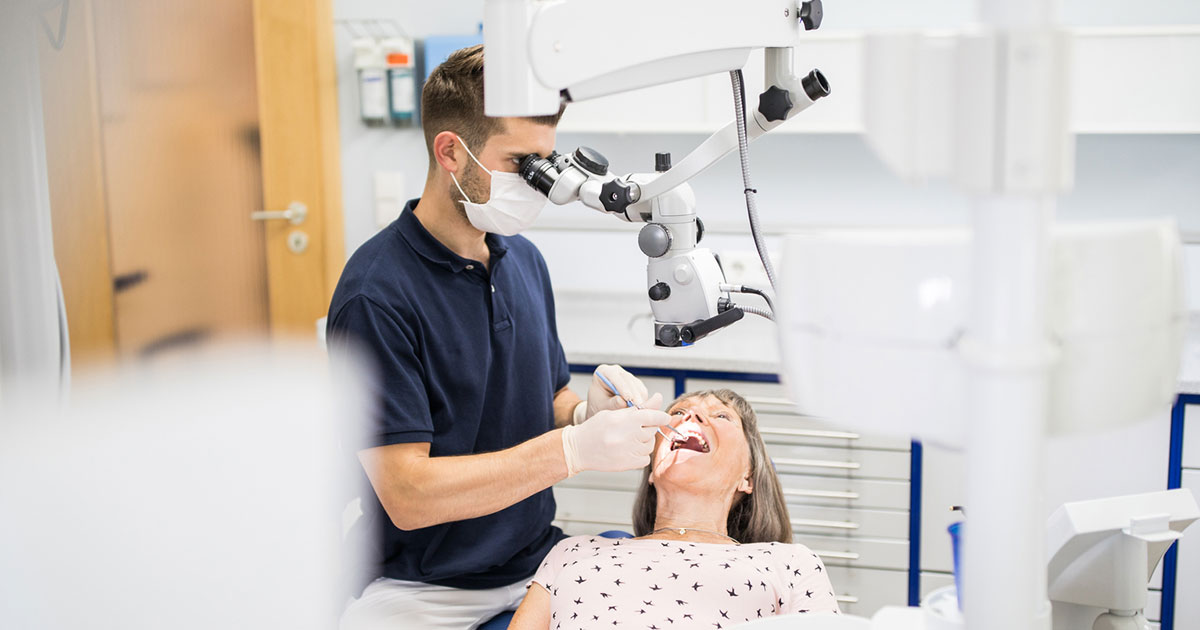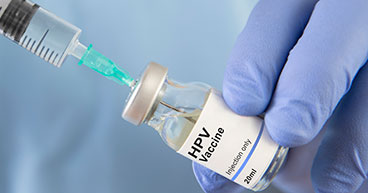
When you’re diagnosed with cancer, visiting the dentist is probably the last thing on your mind. But many cancer treatments, such as surgery, radiation therapy and chemotherapy, have the potential to significantly impact the health of your teeth. That’s why involving your dentist in your cancer care as early as possible is an integral part of your treatment journey.
Not only can poor oral health lead to complications, it also may interrupt your treatment schedule.
In this article, we’ll explore:
- How dentists may help with oral cancer screening
- Can having cancer affect your teeth?
- Why visit a dentist before cancer treatment?
- Does chemo affect your teeth?
- Does radiation therapy affect your teeth?
- Preventing dental problems during cancer treatment
If you’ve been diagnosed with cancer and are interested in a second opinion on your diagnosis and treatment plan, call us or chat online with a member of our team.
How dentists may help with oral cancer screening
When it comes to oral cancers, which affect the mouth, teeth, gums, tongue and throat, your dentist is often your best line of protection. That’s because they’re able to spot signs of cancer or pre-cancer, like lesions or ulcers, or enlarged lymph nodes in the neck that could indicate cancer spread. They also may notice loose teeth potentially caused by cancer that has invaded supporting bone.
“Dentists are the best health care professionals to perform oral screenings simply because they look inside patients’ mouths all the time,” says Beomjune Kim, DMD, MD, Head and Neck and Microvascular Reconstructive Surgeon at City of Hope® Cancer Center Atlanta.
That’s especially important because, most of the time, oral cancers don’t cause symptoms at early stages, Dr. Kim says. By the time they start causing symptoms, in fact, like pain, numbness or difficulty swallowing, the disease has typically advanced.
“Without an oral exam by a dentist, most patients wouldn’t have any idea anything’s wrong,” he says.
Can having cancer affect your teeth?
Before treatment begins, non-oral cancers don’t tend to have an impact on teeth, but head and neck cancers may.
In addition to cancer’s ability to loosen teeth when it develops in the jawbone, for example, it often causes pain in the mouth once it’s advanced, which may lead some patients to stop brushing their teeth. That may cause bleeding and decay, as well as other periodontal problems.
Furthermore, radiation therapy for head and neck cancer may weaken your teeth and reduce your saliva.
“When patients have less saliva, they’re more prone to developing dental decay and periodontal disease,” Dr. Kim says. “Radiation is a major factor in dental deterioration.”
Why visit a dentist before cancer treatment?
Cancer doctors strongly encourage their patients to visit the dentist before starting treatment for numerous reasons. To begin with, your dentist may help you treat any sources of infection or dental decay beforehand. That may include gum infections, cavities that need filling, ill-fitting dentures or mouth sores. Addressing these issues early may help avoid complications later.
Also, oral cancers sometimes require surgery to remove teeth, especially if the cancer’s surrounding the teeth.
“It’s better to see a dentist before surgery, so they can take impressions for prosthetic teeth,” Dr. Kim says. “That gives them a baseline to work with after teeth are removed.”
Does chemo affect your teeth?
If you practice good oral hygiene, you have less risk to your teeth from chemotherapy. But if you have poor oral hygiene or are struggling with hygiene due to side effects of treatment, you may develop problems like inflammation or infection in the mouth.
Some chemotherapy drugs also may cause damage to the mucosal tissues in the mouth and digestive tract, creating sores, a temporary condition called mucositis. Certain drugs may also make it harder to eat, talk and swallow.
Plus, it’s important to remember that chemotherapy and other cancer treatments suppress the immune system, which may make you more susceptible to developing dental infections and worsening dental problems.
Your doctor and dentist can recommend ways to treat a painful mouth and gums, dry mouth and changes in taste caused by chemotherapy. They may advise supportive therapies like cold lasers and naturopathic support, for example.
It’s important to tell your health care team of any pain or discomfort you’re experiencing early so it’s addressed as quickly as possible.
Does radiation therapy affect your teeth?
Radiation therapy to the head or neck may harm your dental health. For example, it may reduce the calcium in tooth enamel, which can lead to cavities or the kind of salivary gland damage that causes dry mouth. The treatment also may increase your risk for developing tooth decay.
Your dentist may recommend a fluoride gel or rinse to help harden the enamel of your teeth, along with techniques for keeping your mouth moist. Other supportive care therapies, like acupuncture, may also help.
Another common side effect of radiation therapy is a condition called osteoradionecrosis, which occurs when radiation to the head or neck damages the blood vessels that supply the jawbone with nutrients and oxygen. That keeps the bone from healing itself and, ultimately, results in the bone dying. If osteoradionecrosis develops, you’ll likely need surgery to remove part of the jawbone and reconstruct the jaw.
Preventing dental problems during cancer treatment
Before treatment begins, Dr. Kim advises having your teeth cleaned by a dentist, a procedure recommended every six months. Your dentist should also remove or repair any bad teeth prior to starting treatment.
If you have oral cancer, your treatment will typically include surgery followed by radiation therapy. During that time, which lasts about three months, it’s usually not possible to keep up with regular dental cleanings with your dentist, but it is critical to stick to a strict oral hygiene routine, Dr. Kim says. That includes brushing your teeth with a soft brush after every meal and at bedtime, as well as flossing every day, even if your mouth’s sore. It also means using a mild oral rinse that doesn’t contain alcohol.
In addition, you should rinse with a diluted solution of baking soda and salt, followed by plain water, to moisten the mouth, which may help reduce the amount of cavity-causing bacteria and restore your pH balance after vomiting.
Also during treatment:
- Avoid sugary candy, gum and soda
- Avoid products that may lead to mouth problems, including toothpicks, sharp chips, acidic or spicy foods, tobacco or alcohol
- Stay well hydrated during treatment
Once cancer treatment is complete, you should visit your dentist every three months for the first year, Dr. Kim says.
“That first year is crucial for taking care of dental health,” he says. And always remember your dentist is there for you as a trusted resource whenever you need them.
“Dentists can provide really helpful counseling both before and after treatment,” Dr. Kim says.
If you’ve been diagnosed with cancer and are interested in a second opinion on your diagnosis and treatment plan, call us or chat online with a member of our team.



